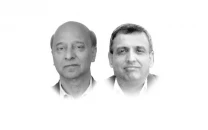Altering Mughal history in Indian textbooks
This is not the first time the BJP-led government has surgically altered school curricula

In the 2025-26 academic year, the National Council of Educational Research and Training (NCERT) in India introduced a revamped Class 8 Social Science textbook that has stirred significant controversy. The new content devotes extensive space to portraying Mughal emperors — particularly Babur, Akbar and Aurangzeb — as intellectually refined yet deeply brutal rulers who plundered, enslaved and forcibly imposed their rule on Indian populations.
Akbar, once widely celebrated as a symbol of secularism, is now shown as a temple-razer who slaughtered civilians, with only a brief reference to his later turn toward peace. Similarly, Babur is acknowledged for his appreciation of poetry and architecture but also condemned for his ruthlessness in conquest. Aurangzeb is portrayed primarily through the lens of temple destruction and religious persecution.
The NCERT justifies this revision as an attempt to "unsanitise" Indian history, presenting rulers in their full complexity. However, critics argue this is less about academic honesty and more about a deeper political agenda — one that seeks to delegitimise the Muslim contribution to Indian civilisation by highlighting brutality over cultural or administrative legacy.
This is not the first time the BJP-led government has surgically altered school curricula. Since coming to power in 2014, the Bharatiya Janata Party (BJP), guided ideologically by the Rashtriya Swayamsevak Sangh (RSS), has consistently revised textbooks to reflect its vision of India as a Hindu Rashtra — one that prioritises Hindu identity over its constitutionally secular ethos. Under this agenda, Muslim rulers, who were once part of a nuanced narrative of India's pluralistic past, are being reduced to foreign invaders and religious bigots.
Entire chapters on the Delhi Sultanate and Mughal courts have been removed from older textbooks. Muslim leaders like Maulana Abul Kalam Azad, India's first education minister and a key figure in the freedom struggle, have been omitted from political science curricula.
The irony, however, is inescapable. Monarchs throughout history - whether Hindu, Muslim, or Christian — have employed violence as a tool of statecraft. Mughal emperors, like others, engaged in war, suppressed dissent and sometimes destroyed religious institutions. British monarchs in the 16th to 19th centuries killed, converted, and colonised on a massive scale in both Europe and their colonies. Henry VIII had his wives and political rivals executed. Queen Elizabeth I suppressed Catholics and waged wars in Ireland. Even within their own families, European monarchs eliminated siblings, cousins and advisers for power. Violence and conquest were the very grammar of monarchy.
To underline Mughals as barbaric, while ignoring the universal behaviour of monarchs, is historically dishonest and academically irresponsible. The Mughals, in their centuries of rule, also chronicled some of India's most enduring institutions — in administration, art, architecture and interfaith dialogue. Akbar's Din-i-Ilahi and his policy of Sulh-i-Kul (peace with all) were pioneering experiments in religious coexistence.
Such academic distortion manufactures critical political consequences. By poisoning young minds with partial history, the Indian state is emboldening a generation to view India's 200 million Muslims with suspicion and hostility.
This is not merely revisionist history; it is the sowing of fascism.
This curricular vilification of Mughals aligns with a broader global narrative of portraying Muslims as inherently violent, which is used to justify their marginalisation, persecution, and even annihilation.
This is a global pattern seen recently with the genocide in Gaza and, before that, the destabilisation of Iraq, Libya, Lebanon and Syria through foreign interventions that contrived prolonged civil wars. These interventions disproportionately fractured the political structures and social cohesion of Muslim-majority societies.
History must be told in full — its glories and horrors alike. Cherry-picking atrocities to vilify a community while erasing contributions is plainly propaganda. Its consequences will erupt in society, in politics and in blood.













COMMENTS (2)
Comments are moderated and generally will be posted if they are on-topic and not abusive.
For more information, please see our Comments FAQ